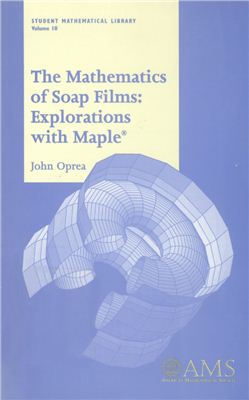AMS, 2000. - 266 pages.
Nature tries to minimize the surface area of a soap film through the action of surface tension. The process can be understood mathematically by using differential geometry, complex analysis, and the calculus of variations. This book employs ingredients from each of these subjects to tell the mathematical story of soap films.
The text is fully self-contained, bringing together a mixture of types of mathematics along with a bit of the physics that underlies the subject. The development is primarily from first principles, requiring no advanced background material from either mathematics or physics.
Through the Maple® applications, the reader is given tools for creating the shapes that are being studied. Thus, you can "see" a fluid rising up an inclined plane, create minimal surfaces from complex variables data, and investigate the "true" shape of a balloon. Oprea also includes descriptions of experiments and photographs that let you see real soap films on wire frames.
The theory of minimal surfaces is a beautiful subject, which naturally introduces the reader to fascinating, yet accessible, topics in mathematics. Oprea's presentation is rich with examples, explanations, and applications.
Nature tries to minimize the surface area of a soap film through the action of surface tension. The process can be understood mathematically by using differential geometry, complex analysis, and the calculus of variations. This book employs ingredients from each of these subjects to tell the mathematical story of soap films.
The text is fully self-contained, bringing together a mixture of types of mathematics along with a bit of the physics that underlies the subject. The development is primarily from first principles, requiring no advanced background material from either mathematics or physics.
Through the Maple® applications, the reader is given tools for creating the shapes that are being studied. Thus, you can "see" a fluid rising up an inclined plane, create minimal surfaces from complex variables data, and investigate the "true" shape of a balloon. Oprea also includes descriptions of experiments and photographs that let you see real soap films on wire frames.
The theory of minimal surfaces is a beautiful subject, which naturally introduces the reader to fascinating, yet accessible, topics in mathematics. Oprea's presentation is rich with examples, explanations, and applications.

